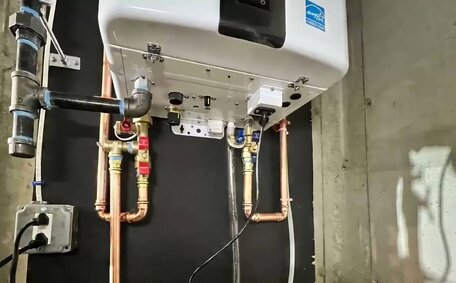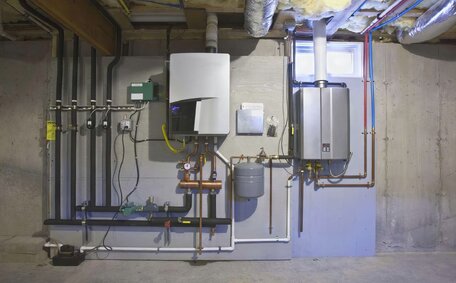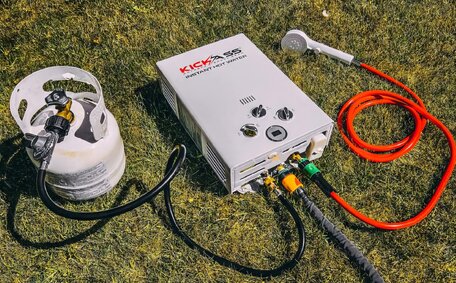Understanding Why You Have No Hot Water
Experiencing a sudden loss of hot water at home is exceptionally inconvenient, upending your daily routine. A fully functional hot water system is crucial for daily activities like showering and cleaning. Should the supply cease, it can leave your household routines in disarray.
The loss of hot water service can stem from various issues, such as burst or leaking pipes, and blocked drains hindering the tank’s drainage. Pilot lights on your system can extinguish if their thermocouple malfunctions.
Your gas hot water systems can fail due to issues with the heating elements, thermostat, pilot light, gas valve, or water pressure.
Determining the cause of your system’s hot water shortfall is the first step in troubleshooting. We’ll guide you through simple checks like making sure power and gas are connected, testing thermostats and relighting pilot lights. If basic steps don’t restore service, we’ll then investigate other culprits like leaks, drainage problems or larger system failures. We aim to restore your hot water quickly and safely.
Checking Basic Issues First
When you discover there is no hot water, the first troubleshooting steps should address basic issues that you can quickly check yourself:
- Initially, ensure your electric heater’s power is on and look for any tripped circuit breakers for a quick resolution. Check your main panel for tripped switches and reset them if necessary.
- Confirm gas supply lines are completely accessible to permit the flow of cold water through gas water heaters. Make sure any shut-off valves on the gas line and at the unit are in the open position, to ensure there’s enough hot water flowing.
- Examine all hot water taps, including the shower, kitchen sink, and laundry. Turn taps on full to check if water is coming out unobstructed.
- Verify that the heater tank is sufficiently filled and the inlet valve is completely open for effective heating.
- Inspect your house’s thermostats and heating elements on electric units to ensure they are still functioning well without any damage or defects.
- For gas heaters, verify the pilot light is lit and has not been accidentally turned off. Press reset buttons as needed and apply the correct techniques to reignite the pilot, ensuring gases are off your water heater.
These initial troubleshooting steps can often quickly restore your hot water, but please contact us if further assistance is required. However, if hot water remains missing after checking the usual suspects, there might be a bigger issue - that’s the time to give us call for an expert diagnosis and repair.
Electric Water Heater Troubleshooting
When troubleshooting an electric hot water system, there are a few key areas to check if you have no hot water:
- Circuit Breaker - Check if the circuit breaker for your water heater has tripped. Reset the breaker switch to restore power to the unit, noting frequent tripping can cause underlying concerns. If it trips again soon after, this likely indicates an electrical issue needing professional repair.
- Fuses - Inspect the fuses connected to your water heater. Replace any damaged fuses, as these can interrupt power flow even if they are not visibly blown.
- Temperature Controls - Make sure your thermostat is set correctly and test any heating elements to confirm they activate when water temperature drops. Faulty controls prevent your tank from heating properly.
- Pressure Relief Valve - Release buildup in the PRV valve to maintain proper water pressure, ensuring your tank can heat up correctly. If pressure is too low, this can prevent heating elements from working effectively.
- Sediment - Over time, sediment in the tank can coat heating elements and reduce their effectiveness. Drain and flush your tank annually.
- Wiring - Loose wiring connections to heating elements, thermostats or high-limit switches can stop your system from working properly and heating water as needed.
Routine troubleshooting can often remedy common issues and reinstate your hot water supply. However, if the issue remains unresolved, it’s advisable to contact a professional plumber for a precise remedy.
Gas Water Heater Troubleshooting
Troubleshooting gas water heaters when you have no hot water requires carefully checking a few key components:
- Pilot Light - If the pilot light goes out, give a thorough check to see that the burner can’t ignite to heat water. Check that the pilot is still lit. If not, follow proper safety procedures to relight it.
- Thermocouple - The thermocouple sends a signal to the gas valve to open and allow gas flow when the pilot light is on. If it malfunctions, the pilot may go out.
- Gas Valve - Make sure your main gas shut-off valves are fully open. Try resetting the gas valve by switching it all the way off for 30 seconds, then back on.
- Gas Supply - Check the gas lines for any leaks, breaks, or blockages that could limit flow to the water heater. Contact the gas company if external supply lines are the issue.
- Flue Blockage - Ensure the system’s vents and flues allow proper airflow. Blockages can prevent exhaust gases from escaping.
Thoroughly following safety protocols in troubleshooting your gas water heater may swiftly resolve a lack of hot water. If reigniting your pilot or resetting the gas valve is ineffective, a certified plumber should be called for any persistent, unresolved issues.
Identifying Signs of Bigger Issues
There are a few key signs that may indicate larger problems requiring professional service beyond basic troubleshooting:
- Leaks - If you detect a water leak on the floor near your hot water heater or see dripping from the tank, this likely signifies a significant issue. Leaks that compromise system efficiency and reliability signal the need for professional intervention.
- Low Water Pressure - Inadequate water pressure can prevent your tank from heating properly. Check the pressure at your taps and ensure there’s adequate water flowing; contact a plumber if it’s below 45 psi.
- Odd Noises - Strange rumbling, banging or hissing from your water heater can signify internal valve or heating element faults.
- Age Issues - Water heaters traditionally last 8-12 years; if yours is older, it might be time to invest in new hot water equipment.
- Rust Coloured Water - Rusty water usually means corrosion and sediment buildup in your tank, restricting hot water flow.
Noting these issues implies its time call a professional for significant water heater repairs or to discuss a replacement. Malfunctions that fully cut off hot water are considered emergencies needing rapid response.
Performing Preventative Maintenance
Regular upkeep of your hot water system can forestall outages and enhance performance. Simple preventative steps include:
- Flush Your Tank - Annual flushing removes sediment and limescale buildup. This practice ensures smooth operation of heating elements and prevents corrosion issues.
- Check Connections & Seals - Tighten any loose pipe fittings or wiring connections. Inspect tank exterior and pipes for leaks. Replace worn seals.
- Test Temperature & Pressure Valves - Verify pressure relief and temp/pressure valves open and close properly to avoid dangerous buildup.
- Clean Filters & Aerators - Clear debris from water filter screens and faucet aerators to maintain flow.
- Inspect Anodes & Descaling - Anode rods protect your tank interior from corrosion. Replace if worn. Descaling combats existing mineral deposits.
Adopting a consistent maintenance schedule enables your hot water system to perform reliably and efficiently. This practice helps you identify minor issues before they escalate, preventing unexpected service disruptions.
Knowing When to Call a Professional
There are certain situations where it’s crucial to contact a licenced plumber rather than trying to troubleshoot no hot water issues yourself:
- Gas Leaks - If you smell gas from your hot water system or suspect any kind of gas leak, immediately shut off gas supply valves and call the fire department and plumber.
- Faulty Electrical - Issues like repeated tripping of your electrical circuit breaker when resetting it or seeing sparks indicate faulty wiring that only a professional can safely handle.
- Water & Gas Supply Problems - If external utility lines delivering your water supply are damaged, report the matter to the concerned companies.
- Low Water Pressure Issues - Inadequate building water pressure must be addressed at the mains to properly restore hot water functionality.
- Major Leaks - Large leaks coming from water tank itself likely mean a crack requiring replacement, not a DIY fix.
- Drainage Problems - Blocked drains preventing proper drainage from water heater require professional drain cleaning equipment.
Croydon Park Plumbing offers round-the-clock service for urgent plumbing issues in Sydney’s Inner West and the Hills District. Call 1300 349 338 or email jobs@croydonparkplumbingservices.com.au for no hot water repairs, replacements and troubleshooting assistance.
Frequently Asked Questions
What reasons do I face when encountering a lack of hot water?
There are several common reasons why you may lose hot water service, including:
- - Faulty heating elements or thermostat failure in electric water heaters
- - Pilot light going out or thermocouple issues in gas water heaters
- - Tripped circuit breaker or blown fuse interrupting power
- - Insufficient water pressure preventing the tank from heating
- - Leaks or cracks developing in the water heater system
- - Sediment buildup or drainage issues impacting functionality
How can I get my hot water working again?
Begin by addressing simple concerns such as inspecting circuit breakers, gas valves, pilot lights, and water pressure.
What capacity water heater is best?
A 135L unit typically suits a household of 2-3 people; larger families or those with higher consumption may need more capacity.
Why does my water heater make noise?
Occasional pops or drips are normal, but consistent rumbling, banging or hissing noises indicate problems like sediment buildup, failing heating elements or issues with water pressure or gas flow requiring service.
How often should I drain or flush my water heater?
To prevent sediment accumulation and corrosion, flush your water heater tank annually. This process removes scale deposits, enabling more effective operation of heating systems. Regularly flushing your water heater prolongs the system’s lifespan.






